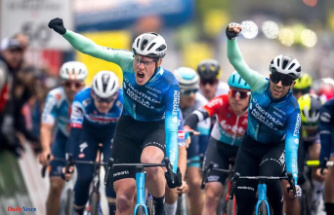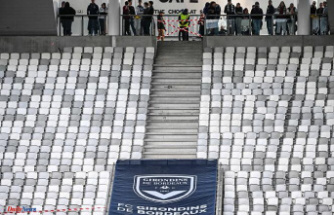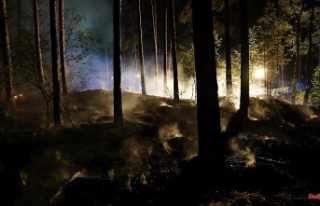Her run to the European title lasted just 10.99 seconds, but that was followed by exciting hours for Gina Lückenkemper. The slashed left knee requires treatment in the emergency room. The day after, she happily tells of an extremely short but eventful night.
The fastest woman in Europe has a hard time getting up. "To be honest, I had imagined it a little differently," says Gina Lückenkemper the day after her sensational victory in the 100-meter final in Munich, "when I win a European championship title, I actually wanted to celebrate it differently than in the emergency room ." Back at the German team's hotel, she's still beaming at the press conference - after a short night with little sleep. "The left knee is patched," says the 25-year-old from her medical file, "the right leg is full of abrasions and swelling."
After 10.99 seconds, Lückenkemper threw himself across the finish line, then fell and tore his left knee with the spikes of his right foot. "A small flesh wound", she now calls it herself, which gave her a "very exciting evening". Instead of going straight to the lap of honor in black, red and gold in the Olympic Stadium, which was filled with 40,000 completely euphoric spectators, the bleeding first had to be stopped. "I didn't have it that way either," Lückenkemper summarizes the next few hours with a laugh, "that a competition ended like this for me."
In the following hours, the celebrations were largely canceled, but the outstanding German sprinter of the past few years unexpectedly got completely new insights. "I've never driven an ambulance before," says Lückenkemper, "I've never been to the emergency room before." Of course she would have preferred to enjoy the impressive atmosphere in the stadium longer, but "it was actually really exciting and I found everything that happened there super exciting."
The starting signal was given at 10:25 p.m., and at 1:24 a.m. the DLV reported that the new European champion over 100 meters had just arrived back at the team hotel in the Olympic Park. "I'm doing well now, given the circumstances," she says almost 14 hours later. Walking works again, a bit of cycling too, but when getting up, Lückenkemper has to support himself at the table to get back on his feet. Before that, however, she tells us in her usual informative, open manner that she was accompanied in the ambulance by officials: "I did my doping test in the emergency room."
It fits this special evening that the 25-year-old also had to give a urine sample after the wound was sewn up. "After that we drove back to the hotel", where her American trainer Lance Brauman was still waiting for her "he didn't want to miss the opportunity to welcome me here". But there were no big celebrations anymore, "because I was simply flat out" after all the exciting first times: first European championship title, first ride in an ambulance, first visit to the emergency room. However, she reveals that she did not find any really restful sleep afterwards.
It was "two hours" simply "because I couldn't find a position". The anesthetic of first aid slowly wore off while Lückenkemper tried to align her battered body to sleep. "On the one hand the stitched knee, on the other hand all the abrasions," she describes the coordination challenge, "that didn't make the whole story that easy for me."
The night fitted into a day of competition that certainly offered enough excitement. The finale was the final act of a crime thriller that continued to escalate as Tuesday progressed. The atmosphere in the stadium had already reached boiling point due to the European title for decathlete Niklas Kaul when the sprinters were allowed to end the evening. But it was even louder, even more euphoric: Lückenkemper visibly enjoyed the scenery, grinned at her performance and soaked up the atmosphere. Like hardly anyone else, she seems to be able to focus at the last moment when it comes to the starting block.
The fact that she once again had the slowest reaction time in this final is nothing new for the 25-year-old, she has always been the "hunter", she says, and she doesn't let that bother her. She sprints - and how. She worked her way past opponent after opponent, fighting for every thousandth. She wasn't exactly sure how successful her hunt was this time when she reached the target. "I only really realized it when it got loud in the stadium and the next moment I saw on the scoreboard that the Germany flag had popped up next to the 1," she said the day after. "Before that, I had no idea what it was enough for at that point. I was pretty sure it was enough for a medal because I didn't realize that so many pushed forward, but I got it that it was incredibly tight."
Her feeling did not deceive her, only the evaluation of the finish photo brought victory, the athletes and the raging audience in the stadium had to wait a few agonizingly long seconds. In the end, Lückenkemper was literally in the lead. "I mean 10.99, 10.99, 11.00 - I think that speaks for itself. In the end it was only five thousandths between Mujinga (Kambundji, silver medalist from Switzerland, editor's note) and me, So that's extreme and shows how close the whole thing was. But I think with the finish you can definitely say: I wanted that thing."
For "the thing" she had suffered some torment throughout the day - unnoticed by the general public, a little drama was taking place in the German team. She has been struggling with flexor problems in her left thigh since Monday, and she went into her semi-final in the morning in a heavily taped state. It's hard to imagine after the run, but Lückenkemper actually considered not starting at all. "The feeling in the hamstring was so weird before that I was about to consider not going to the final because I was just too worried about hurting myself ' she looks back.
For the finale, however, she appeared without any tape on her thighs. A flash cure because she got the riot act in between, as she says. Namely from Brauman, who had "a sense" for what she "really needed at the moment". Because a technical error had crept into her sprinting, which Brauman recognized during the warm-up and dealt with mercilessly. "Then Lance pulled me aside and said to me, 'Gina, I just saw you running - if you're running behind your body with your leg the whole time, then you shouldn't be surprised if your hamstring hurts . Just run sensibly.'" He then wanted to show her how she looked while running and almost got a cramp himself and said: "You see how stupid it is when you do it like that."
It was a real training session that Brauman pushed into his athlete in 20 minutes, the "gross technical error" could be solved - and with it her pain. "Lo and behold, all of a sudden I was able to dash across the warm-up track again without any pain or discomfort, without even having felt anything," says Lückenkemper. It was the moment when it was clear that giving up the final was out of the world, she was ready to take on the best in Europe. So ready that she voted best.
The question of being ready will also accompany Lückenkemper in the next few days. On Friday the women's heats over 4x100 meters are scheduled, the German relay is of course one of the big favorites at the European Championships after bronze at the World Cup. The 25-year-old does not believe that the almost 48 hours are enough to allow the wound to heal for the next maximum load. "The seam is still too fresh for that", so the DLV quartet will most likely have to tackle the qualification for the final without the individual European champion.
The final on Sunday evening is the conclusion of the competitions in Munich, should ideally bring a German sense of achievement - and euphoria the people in the Olympic Stadium for the last time, as Lückenkemper does on this impressive Tuesday evening. The sprinter hopes that the knee will play its part again by then. "Of course we don't have a guarantee," she says, somewhat restrictively, "but we definitely don't want to leave it untried." And if Gina Lückenkemper proved one thing in Munich, it was her talent for turning unexpected challenges into something good.












